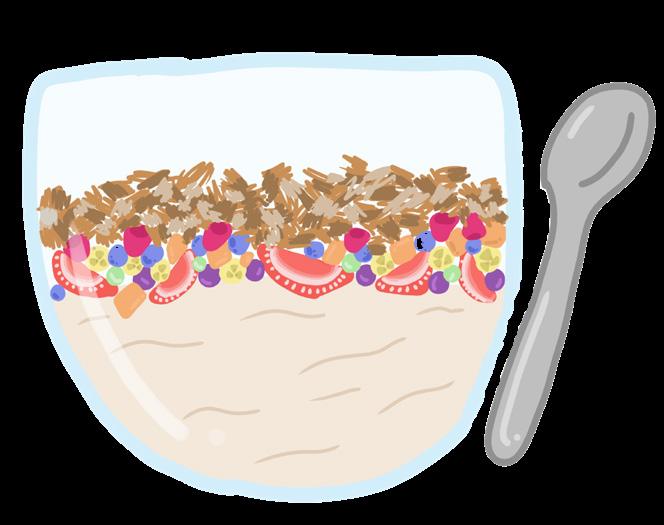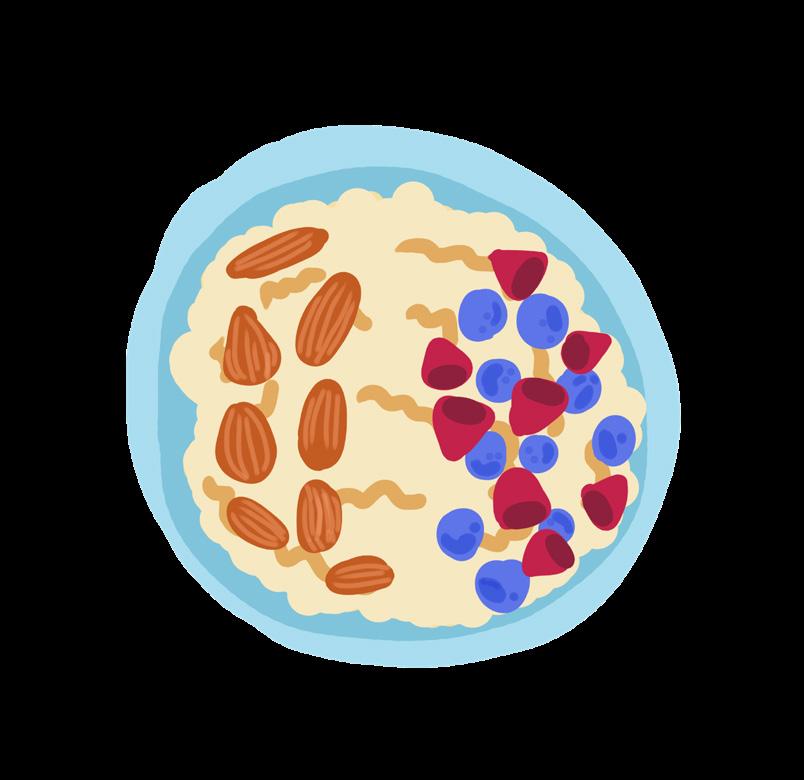2 minute read
Better Breakfast made
Eating breakfast corresponds to better health for students
Most people have heard the phrase: “breakfast is the most important meal of the day,” but is that true? According to nutrition researcher Ana López-Sobaler, a healthy breakfast is associated with “better body weight control and healthy cardiometabolic risk indicators.” Skipping breakfast has been linked to weight gain and obesity because it can lead to overeating later in the day.
Studies also suggest that a healthy breakfast is related to improved cognitive functions, such as memory and concentration, particularly in children and teenagers. Increased energy levels are another benefit of eating a healthy breakfast, as it gives the body the energy needed to start the day. It has even been linked to lower levels of stress and anxiety.
STORY BY Caitlyn Acosta and Gabie Soivilus
Egg on Avocado Toast
• Balances Cholesterol
• Heart-Healthy
• Has good sources of protein and natural fat
• Whole grains reduce the risk of diabetes
Parfait (granola, oats, and Greek yogurt)
• Promotes brain health
Provides your body with nutrients and Has natural sugars, fiber, healthy fats, and is
I think [eating breakfast] improves my performance at school because I won’t be thinking of eating, and I’ll have more energy to focus during class.”


Spencer Blake, 10


I think it is important to eat breakfast to sustain your body throughout the day. Your brain needs calories to work. I think eating breakfast helps me stay focused and happy throughout the day.”


Eliani Carr-Betts, 9

Oatmeal with nuts and berries
• Lowers blood sugar levels and balances cholesterol
• Can protect your skin against irritation
• It is also very filling and is filled with vitamins

• Has a good source of healthy carbohydrates and fiber certified via the International Sports Science Association. Black urges students to keep a few things in mind when eating in the morning.
“It’s important to listen to your body and find a meal pattern that works for you, rather than sticking to a rigid schedule,” Black said. “Everyone’s body is different so it is important to keep in mind your personal dietary restrictions, allergies, needs and preferences when choosing something to eat. Some people may not feel hungry in the morning and that is OK. Listening to your body is important, and it is best to find a meal pattern that works right for you. Portion sizes are also something to keep in mind, not everyone needs a big breakfast, so be cautious of overeating. Finding the portion that is right for you that makes you feel energized and ready for the day is key so that you do not eat more than you need. Many people may not find the time in the morning to cook something from scratch, so instead, you could prepare something beforehand or find something quick and healthy to take on the go.”
Nellie Black Sports Nutritionist



MSD students follow global trend of rising caffeine intake
Results are based on a survey of 423 MSD students
Caffeine is a heavily consumed substance that is easily accessible. It can be found in popular beverages like coffee, but is naturally occurring in more than 60 plants such as tea leaves, cacao pods and kola nuts which are found in soft drinks and sodas. Synthesized caffeine has also been fabricated to be an energy additive to many common goods like medicines, gums and foods.
The rise in caffeine consumption can be directly influenced by a constant change in social trends. The popularity of lattes, cappuccinos, frappes and shops like Starbucks and Dunkin’ Donuts all have led to increased caffeine consumption in a multitude of forms.
STORY BY Alison LaTorre and Sofia Schorer Kaplan

